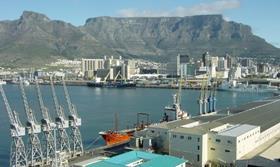
Shipments of South African summer citrus fruit to the US will now wind down following the departure of the last conventional reefer vessel of the season from Cape Town to the port of Philadelphia.
The last vessel, The Prince of Seas, is carrying mainly Midknight Valencias, which are expected to dominate sales from now until the end of the season.
The Prince of Seas will arrive in Philadelphia on 18 October and, according to WCCPF officials the South African industry, will try and clear its stock as soon as possible to pave the way for the start of the new Californian season.
Ironically, it was the overflow of a large Californian crop that slowed things down at the start of the South African and Southern Hemisphere season. Despite this, the season for South African summer citrus fruit has gone well, the only blemish being the impact of the strengthening South African currency, which is eroding farm returns.
'We are particularly pleased with our shipping programme which marked the start of a new shipping agreement with the Seatrade-Anlin partnership,' says Joretha Geldenhuys, CEO of the WCCPF.
Ms Geldenhuys notes that during 2010, the South African industry shipped fresh supplies to the US every 10 days, instead of every 14 days as was the custom during 2009.
'This is due to the fact that Seatrade offered us smaller vessels which could be filled more frequently,' she explains. 'This resulted in a very efficient supply system which benefits all parties.'
With the sailing of the last conventional vessel, total shipments to date have now passed the 41,000 pallet mark. 'This means that we could stick with our pre-season shipping plan and our trading partners appreciated the consistency in our planning and execution,' says Ms Geldenhuys.
She adds that this season has seen an increase in the use of conventional reefer space at the expense of containers. 'At the beginning of the season we had to move fruit destined for containers to the reefer vessels because of the transport workers' strike, and that really set a trend for the season. From now on until the end of the season, however, containers will be crucial as some of our exporters are still completing their direct supply programmes to retailers in the United States.'
Emphasising the fact that that both specialised reefers and containers are important for the industry, Ms Geldenhuys says: 'At the start of the season we simply do not have enough fruit to fill reefers and we need to fulfil commitments during this period. The same applies at the end of the season and there may well be periods within the season where exporters may favour containers for specific customers.'
The WCCPF is pleased with the first season of working with Seatrade, as Ms Geldenhuys outlines. 'They have gone out of their way to assist the industry and this business partnership can only grow in future.'
She notes that the success of the South African programme in the US is based on grower cooperation in logistics, shipping and promoting South African summer citrus fruit amongst US consumers.
'Outside this we have a free market orientated marketing system which brings healthy competition between exporters from South Africa and importers into the United States.'
Ms Geldenhuys will soon travel to Philadelphia where she will oversee the completion of this season's sales. 'I think the WCCPF's programme of placing growers in Philadelphia throughout the season has again worked well,' she notes. 'It helps us to know exactly what is happening to our fruit and provide good feedback for growers and packers so they can take good marketing decisions.
'I will spend a lot of time in the ports, at both Philadelphia and Newark, to see in which way we can still improve our operations,' Ms Geldenhuys adds. 'Successful fruit exporting is always based on good relations and people understanding each other and that is always our aim.'
At the end of the season the members of the WCCPF will meet to discuss new strategies.



